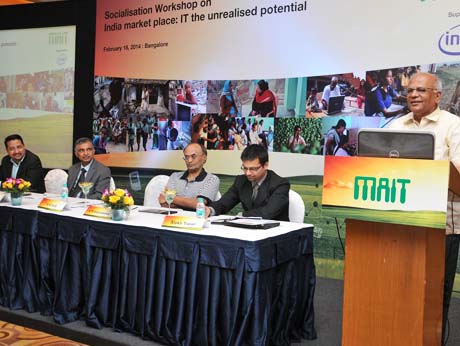
Bangalore, February 20, 2014:A study undertaken by analysts KPMG on behalf of MAIT, the apex body of the Indian IT Hardware industry has projected a cumulative employment opportunity for over 100,000 people as well as a GDP of Rs 663 billion over the next four years.
Said Alekh Tiwari, Associate Director, KPMG: “The Indian IT hardware industry can look forward to making a substantial impact by taking some of the steps such as bringing down the hardware cost by 43% with the help of government subsidies, reducing the total cost of ownership of a PC and broadband solution, providing income tax exemption to individuals against PC purchase, and promoting the purchase of PCs amongst specific segments like students and households with annual income below Rs 500,000.
He was speaking at a MAIT workshop on “India Market Place: IT the unrealised potential”.
Karnataka IT, BT and S&T Minister S R Patil, pledged all support to MAIT. He urged a shift in policy, tax restructuring, better functioning with the union government and reiterated his call to make Karnataka a ‘hardware hub of the country’
Added Anwar Shirpurwala, Executive Director, MAIT:“Karnataka has an enviable record in Information Technology; Hardware Manufacturing presents a huge opportunity and Karnataka can set benchmarks by being a hardware exporter”. He emphasized doing away with inverted duty structure and subsidies for encouraging domestic manufacturing.
M N Vidyashankar, Additional Chief Secretary (Retd.), of the Karnataka government, revealed that Karnataka was the only state in the country to have integrated e-procurement based on deliverables and outcomes. In the state's e-governance department, 36 massive applications were monitored by 11 people. The e-procurement initiatives saved over Rs 130 billion for the government exchequer.